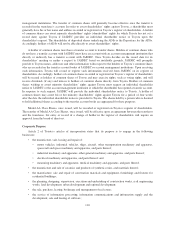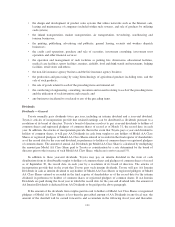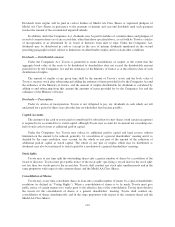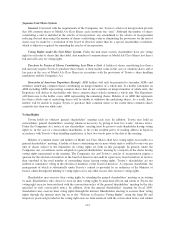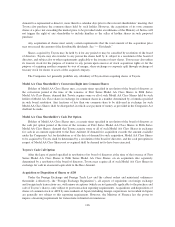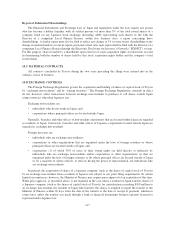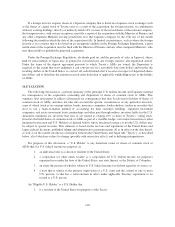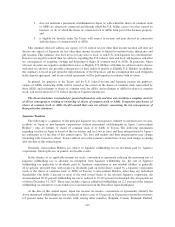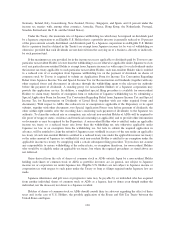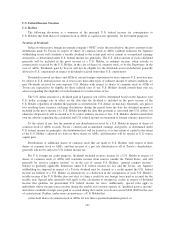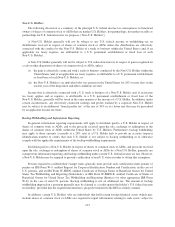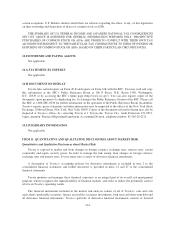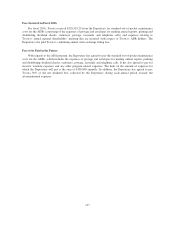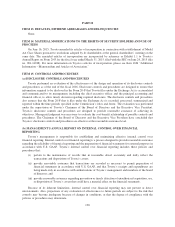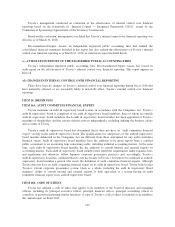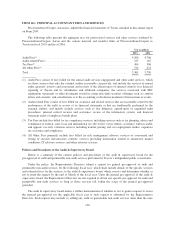Toyota 2015 Annual Report Download - page 125
Download and view the complete annual report
Please find page 125 of the 2015 Toyota annual report below. You can navigate through the pages in the report by either clicking on the pages listed below, or by using the keyword search tool below to find specific information within the annual report.Germany, Ireland, Italy, Luxembourg, New Zealand, Norway, Singapore, and Spain, and 10 percent under the
income tax treaties with, among other countries, Australia, France, Hong Kong, the Netherlands, Portugal,
Sweden, Switzerland, the U.K. and the United States).
Under the Treaty, the maximum rate of Japanese withholding tax which may be imposed on dividends paid
by a Japanese corporation to an Eligible U.S. Holder that is a portfolio investor is generally reduced to 10 percent
of the gross amount actually distributed, and dividends paid by a Japanese corporation to an Eligible U.S. Holder
that is a pension fund (as defined in the Treaty) are exempt from Japanese income tax by way of withholding or
otherwise, provided that such dividends are not derived from the carrying on of a business, directly or indirectly,
by such pension fund.
If the maximum tax rate provided for in the income tax treaty applicable to dividends paid by Toyota to any
particular non-resident Holder is lower than the withholding tax rate otherwise applicable under Japanese tax law
or if any particular non-resident Holder is exempt from Japanese income tax with respect to such dividends under
the income tax treaty applicable to such particular non-resident Holder, such non-resident Holder who is entitled
to a reduced rate of or exemption from Japanese withholding tax on the payment of dividends on shares of
common stock by Toyota is required to submit an Application Form for Income Tax Convention Regarding
Relief from Japanese Income Tax and Special Income Tax for Reconstruction on Dividends (together with any
other required forms and documents) in advance through the withholding agent to the relevant tax authority
before the payment of dividends. A standing proxy for non-resident Holders of a Japanese corporation may
provide this application service. In addition, a simplified special filing procedure is available for non-resident
Holders to claim treaty benefits of exemption from or reduction of Japanese withholding tax by submitting a
Special Application Form for Income Tax Convention Regarding Relief from Japanese Income Tax and Special
Income Tax for Reconstruction on Dividends of Listed Stock (together with any other required forms and
documents). With respect to ADSs, this reduced rate or exemption is applicable if the Depositary or its agent
submits, together with other documents, two Special Application Forms (one before payment of dividends, the
other within eight months after the recording date concerning such payment of dividends) to the Japanese tax
authority. To claim this reduced rate or exemption, any relevant non-resident Holder of ADSs will be required to
file proof of taxpayer status, residence and beneficial ownership (as applicable) and to provide other information
or documents as may be required by the Depositary. A non-resident Holder who is entitled, under an applicable
income tax treaty, to a reduced treaty rate lower than the withholding tax rate otherwise applicable under
Japanese tax law or an exemption from the withholding tax, but fails to submit the required application in
advance, will be entitled to claim the refund of Japanese taxes withheld in excess of the rate under an applicable
tax treaty (if such non-resident Holder is entitled to a reduced treaty rate under the applicable income tax treaty)
or the entire amount of Japanese tax withheld (if such non-resident Holder is entitled to an exemption under the
applicable income tax treaty) by complying with a certain subsequent filing procedure. Toyota does not assume
any responsibility to ensure withholding at the reduced rate, or exemption therefrom, for non-resident Holders
who would be so eligible under an applicable tax treaty, but where the required procedures as stated above are
not followed.
Gains derived from the sale of shares of common stock or ADSs outside Japan by a non-resident Holder
holding such shares of common stock or ADSs as portfolio investors are, in general, not subject to Japanese
income tax or corporation tax under Japanese law. Eligible U.S. Holders are not subject to Japanese income or
corporation tax with respect to such gains under the Treaty so long as filings required under Japanese law are
made.
Japanese inheritance and gift taxes at progressive rates may be payable by an individual who has acquired
from another individual shares of common stock or ADSs as a legatee, heir or donee even though neither the
individual, nor the deceased, nor donor is a Japanese resident.
Holders of shares of common stock or ADSs should consult their tax advisors regarding the effect of these
taxes and, in the case of U.S. Holders, the possible application of the Estate and Gift Tax Treaty between the
United States and Japan.
120


